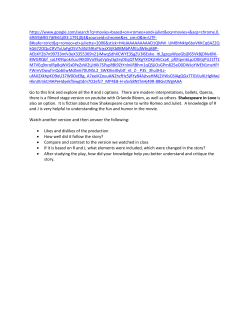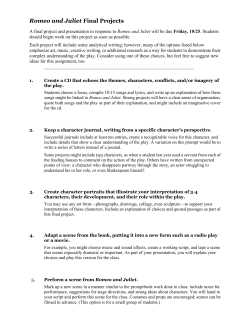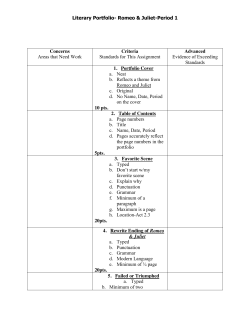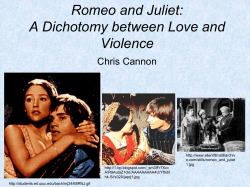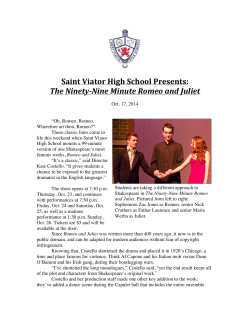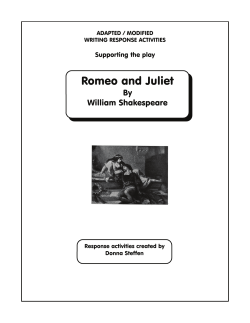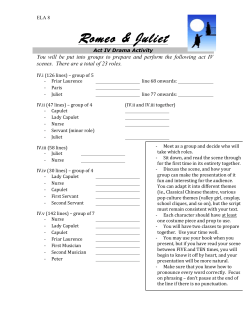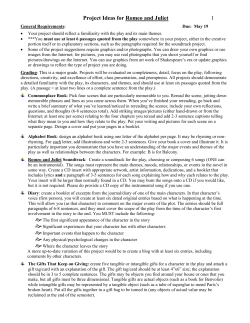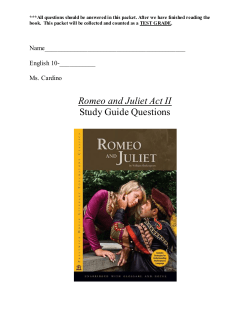
TRAGEDY A play in which events turn out disastrously for the main
TRAGEDY A play in which events turn out disastrously for the main character (usually death). – Elicits both pity and fear: Pity because we feel sorry for the character. Fear because we realize that the character’s struggles are an inevitable part of our lives. Pattern of Shakespeare’s Tragedies Act III Crisis, or turning point Turning Point = choice made by character that determines action of rest of story. Act II Act IV Rising Action Falling action (complications) Act I Act V Exposition Climax and resolution Climax usually = death of main character(s) FOIL a character who sets off another character by contrast EXAMPLE: if the protagonist is a generous and caring individual, his or her foil might be stingy and mean in order to highlight the protagonist’s good qualities through the contrast. Han Solo is a foil of Luke Skywalker in the Star Wars movies. OXYMORON a figure of speech that combines apparently contradictory terms EXAMPLES: – – “sweet sorrow” “loving hate” MOTIF a recurring object, concept, or structure in a work of literature EXAMPLE: – As we read R&J watch for references to the sun, moon, stars, shadows, and other representations of light and dark. Watch out for references to the actual moon, not former NFL QB Warren Moon. ASIDE, MONOLOGUE, & SOLILOQUY ASIDE: an actor’s speech, directed to the audience, that is not supposed to be heard by other actors on stage. An aside is usually used to let the audience know what a character is about to do or what he or she is thinking. MONOLOGUE: a long, uninterrupted speech presented in front of other characters SOLILOQUY: a speech in which a character is alone on stage and expresses thoughts out loud ELIZABETHAN THEATER plays produced for the general public roofless because there was no artificial lighting courtyard surrounded by 3 levels of galleries stage platform that extended into the pit trap door ghosts “heavens” angelic beings no scenery – settings: established through references in dialogue elaborate costumes & plenty of props ELIZABETHAN THEATER [cont.] spectators – – wealthy got benches “groundlings” – – poorer people stood and watched from the courtyard (“pit”) all but wealthy were uneducated/illiterate much more interaction than today actors – – – only men and boys young boys whose voices had not changed play women’s roles would have been considered indecent for a woman to appear on stage ROMEO AND JULIET: ANTICIPATORY SET Agree or Disagree? 1. 2. 3. 4. I believe in love at first sight. Even well-intended secrets and deceptions can be destructive. Revenge often ends up destroying both parties involved. Fate plays a large role in what happens to people. Meet the Characters Romeo Montague lovesick, moody son of a wealthy family feuding with the Capulets Juliet Capulet - smart & innocent; father has betrothed her to Count Paris Meet the Characters (cont.) Lord Montague - head of one of the feuding families; Romeo's dad Mercutio - Romeo's best friend; also a relative of the Prince Meet the Characters (cont.) Friar Laurence - Romeo's advisor & close friend Benvolio - Romeo's cousin/friend; peacemaker Meet the Characters (cont.) Lord Capulet - head of one of the feuding houses; Juliet's dad Tybalt - Juliet's cousin; hotheaded & a good swordsman Meet the Characters (cont.) Count Paris - in love with Juliet; relative of the Prince The Nurse - Juliet's caretaker; fiercely loyal & also provides comedy Presence of Literary Terms? FOIL: a character who sets off another character by contrast EXAMPLE: if the protagonist is a generous and caring individual, his or her foil might be stingy and mean in order to highlight the protagonist’s good qualities through the contrast. OXYMORON: a figure of speech that combines apparently contradictory terms EXAMPLE: “This is a fine mess you’ve made!” MOTIF: a recurring object, concept, or structure in a work of literature EXAMPLE: references to the sun, moon, stars, shadows, and other representations of light and dark PROLOGUE Two households, both alike in dignity, In fair Verona, where we lay our scene, From ancient grudge break to new mutiny, Where civil blood makes civil hands unclean. 5 From forth the fatal loins of these two foes A pair of star-cross'd lovers take their life; Whose misadventured piteous overthrows Do with their death bury their parents' strife. The fearful passage of their death-mark'd love, 10 And the continuance of their parents' rage, Which, but their children's end, nought could remove, Is now the two hours' traffic of our stage; The which if you with patient ears attend, What here shall miss, our toil shall strive to mend. Presence of Literary Terms? FOIL: a character who sets off another character by contrast OXYMORON: a figure of speech that combines apparently contradictory terms MOTIF: a recurring object, concept, or structure in a work of literature
© Copyright 2025
